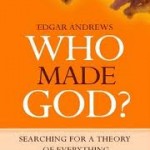Leave a Comment:
(1) comment
I believe the leaders of Christianity will be held accountable for not teaching more of the evidence of Christ & Faith. Maybe if they did more people would believe
Reply
This is the kind of Christian Apologetics book I enjoy reading.
Most apologetics books rehash the same answers and arguments. Occasionally one brings some new insight, or at least a new way of explaining the answers such that it sparks new thought. This is that book.
Fun to read, because the author clearly does not take himself too seriously (he utilizes the English cartoon character `Sooty' in one of his explanations for heavens sake!) yet attacks these serious subjects head on with wit and charm. Yet he shows no mercy to the tired attacks on Christianity of the `new atheists' vis-à-vis physics, miracles, natural law, an immoral God, etc.
One of those supposed argument-ending-money-maker lines of the `skeptic' is always "You say God made everything? Well then tell me who made God?" Andrews spends 278 pages of text and 12 pages of supporting documentation explaining why this is an incoherent question, akin to `Have you stopped beating your wife?' or `how long is string?', and how the answer is evident via a serious analysis of the facts of nature, readily available.
The central thesis of the book is a presentation of the difference between a proof arrived by syllogism, and the preferred and beautiful approach of making a hypothesis and then examining the facts that support it (yes – he is indeed using the Scientific Method to confirm the existence of God!)
This book answers the question with no stone unturned. It's a wonderful primer – a little bit logic, a little bit physics, a little bit philosophy. He makes sure that we don't allow the `new atheists' to get away with phrasing the issues in an incorrect manner, and that we answer the right questions. In doing so, he knocks down fantasy pseudo-sciences such as imaginary time and cyclic universes. He also brilliantly shows why the worn-out complaint of the `God of the gaps', an impotent God (of open theology), a Deistic God, and a Universalist God is NOT the God he is referring to.
The hypothesis Andrews seeks out to prove is status simply: "The God of the Bible exists". He then proceeds to "seek to demonstrate that this hypothesis explains human observation and experience far better than atheism or even science can ever do…" He proves the hypothesis by examining observations in the areas of: Cosmic Origins, the existence and manner of Time, Natural and communal Law, Miracles, Information Theory, the Origin of Life, Abiogenesis, Evolution, and Morality.
Here is an example, regarding miracles, of his unique prose and thought, of which are found throughout…
"C.S. Lewis has a clearer view of the miraculous, pointing out that if a non-material (or spiritual) realm exists at all, there must of necessity be an interface between this realm and the natural world – as a shoreline marks the interface between land and sea. And just as the sea may sometimes flood across that interface and invade the land, so the spiritual may from time to time invade the physical world."
I did have only a few areas of fuss with Andrews – I think he discounts Intelligent Design too quickly, and I think he may have mischaracterized Behe's position on Evolution – but those are easily overlooked in whole.
Too many apologetics books are re-hashed information and arguments – this is not one of those books. This is the kind of book that makes me want to read more of Andrews, and actually write a review recommending him!
I believe the leaders of Christianity will be held accountable for not teaching more of the evidence of Christ & Faith. Maybe if they did more people would believe
Reply